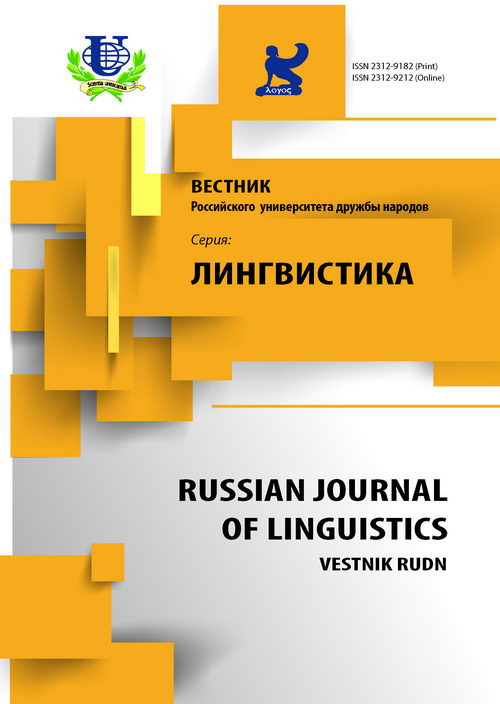No 4 (2010)
- Year: 2010
- Articles: 18
- URL: https://journals.rudn.ru/linguistics/issue/view/593
Articles
Theory of Translation: referential situation and its temporal component as expression of the speaker's inner time consciousness
Abstract
This work is devoted to achieving equivalency in translating from the English language. The focus is on the categories of tense, aspect and perfect of the English verbal forms used in speech as expressing the temporal component of the speaker's language consciousness. The concept of inner-time consciousness is introduced in the analysis from the phenomenological theory of intentionality as the founding concept for any kind of signitive intention. The linguistic signs are treated as means to express and reconstruct parts of the speaker's consciousness responsible for constituting temporal sense.
Russian Journal of Linguistics. 2010;(4):5-12
 5-12
5-12


Albanian relicts in the Armenian translation (transfer) of «The history of Albania» by Moisey Kagankatvaci
Abstract
There are discussions among linguists about the language of the original «The History of Albania» by the Albanian historian of the VII-th century Moisey Kaghankatvatsi-Dashunravi. His work is known in the translation into the Armenian language. Some Albanian words indicative of the language of the original have remained in the Armenian translation.
Russian Journal of Linguistics. 2010;(4):13-17
 13-17
13-17


 18-24
18-24


 25-30
25-30


 31-35
31-35


Discrepancies in connotative potential of the ornitonim Paloma/Golub in Spanish and Russian languages
Abstract
The article is dedicated to the comparative semantic study of Spanish and Russian languages based on the example of ornithonym paloma/palomo and голубь/голубка. The authors' reflections are illustrated by numerous examples from literature, songs and newspapers in Spanish and Russian languages.
Russian Journal of Linguistics. 2010;(4):36-48
 36-48
36-48


 49-57
49-57


Participial construction is a stylistic device of expansion of a German advertising sentence
Abstract
Participial constructions as a part of expansion of syntactic structure contain the components of intensity and estimation, the interaction of which brings about expressiveness of a German advertising sentence along with the compression of information.
Russian Journal of Linguistics. 2010;(4):58-63
 58-63
58-63


 64-69
64-69


 70-77
70-77


 78-82
78-82


 83-89
83-89


Stereotype notions of the moon in the language of the German poetry
Abstract
The article is devoted to the analysis of the German stereotype of the moon in the language of the German poetry. The stereotype characteristic is verified in consequence of the analysis of some traditional poetical figurative meanings.
Russian Journal of Linguistics. 2010;(4):90-98
 90-98
90-98


History of Mexican linguistics: Lope Blanc and the project of the «Linguistic Atlas of Mexico»
Abstract
The historiography of hispanic linguistics, in particular Mexican, is a subject practically not developed in Russian hispanic studies. In this article two aspects of the scientific and pedagogical activity of one of the most outstanding Mexican linguists of the 20th century - J.M. Lope Blanc - are examined: his contribution to the formation of the Mexican linguistic school and his work on the project of the «Linguistic Atlas of Mexico». The knowledge and understanding of the Lope Blanch's linquistic inheritance is necessary to correctly evaluate the development of hispanic studies in the world.
Russian Journal of Linguistics. 2010;(4):99-107
 99-107
99-107


Graduation and method for semantic field as a way lexical-semantic group (in the works of Bulgakov)
Abstract
Laugh - quite a complex phenomenon that requires a detailed multidimensional analysis. That is why there is a huge amount of research approaches to its study. Laughter can be studied in different aspects: the aesthetic, philosophical, aesthetic, cultural, historical, psychophysiological, and other research material and tasks define the approach to the analysis of laughter.
Russian Journal of Linguistics. 2010;(4):108-111
 108-111
108-111


The first Russian «Encyclopedic Dictionary of Biblical Phrases»: its objectives and ways of their achievement
Abstract
The article deals with the aims and objectives of «Encyclopaedic Dictionary of Biblical Phrases» and establishes the base of its acute necessity. The article considers the ways of fulfilling these special tasks and cites examples of similarities and peculiarities of modern Russian biblical expressions and their prototypes found in the Bible.
Russian Journal of Linguistics. 2010;(4):112-118
 112-118
112-118


Comminicative variativity of the French language in the intercultural dialogue
Abstract
The article considers issues of comprehensive study of communicative variativity, description of national and territorial variants of polynational languages with a stress on communicative values of the described cultures and dominant features of communication styles.
Russian Journal of Linguistics. 2010;(4):119-124
 119-124
119-124


Our autors
Russian Journal of Linguistics. 2010;(4):125-126
 125-126
125-126
















